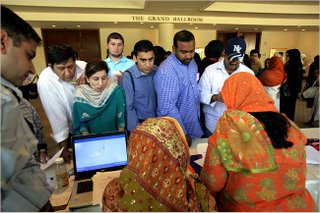 Here's a working paper from the MIT Sloan School of Management on mate preferences and matching outcomes in online dating. Here are a few of the findings:
Here's a working paper from the MIT Sloan School of Management on mate preferences and matching outcomes in online dating. Here are a few of the findings:
Looks and physical attributes:
...there is a surprising “superstar effect” for men. Men in the top five percent of ratings receive almost twice as many first contacts as the next five percent; for women, on the other hand, the analogous difference in outcomes is much smaller.
Members who are “chiseled” and “toned” receive slightly more first-contact e-mails than “height-weight proportionate” users, while “voluptuous/portly” and “large but shapely” members experience a sizable penalty.
Height matters for both men and women, but mostly in opposite directions. Women like tall men. Men in the 6’3 - 6’4 range, for example, receive 65% more first-contact e-mails than men in the 5’7 - 5’8 range. In contrast, the ideal height for women is in the 5’3 - 5’8 range, while taller women experience increasingly worse outcomes. For example, the average 6’3 tall woman receives 42% fewer e-mails than a woman who is 5’5.
Income:
Income strongly affects the success of men, as measured by the number of first-contact e-mails received (Figure 5.6). While there is no apparent effect below an annual income of $50,000, outcomes improve monotonically for income levels above $50,000.
In contrast to the strong income effect for men, the online success of women is at most marginally related to their income.
Education:
Women, in particular, have a preference for men with equivalent education levels. For example, men with a master’s degree receive 48% fewer first-contact e-mails from high school educated women than high school educated men. From college educated women, on the other hand, they receive 22% more e-mails, and from women with (or working towards) a graduate degree they receive 82% more e-mails. Similar to the behavior of women, high school educated men appear to avoid women with higher education levels. There is little evidence, however, that men with college or graduate degrees prefer women with a similar education level.
Occupation
Holding everything else constant, the biggest improvement in outcomes is observed for men in legal professions (62% outcome premium), followed by fire fighters (45%), members of the military (38%), and health related professions (35%). The occupation of women, on the other hand, has little influence on their outcomes; in fact, most professions are associated with a slightly lower number of first contacts relative to students.
Same-race preferences
We find a striking difference across men and women in this stated preference: 38% of all women, but only 18% of men say that they prefer to meet someone of their own ethnic background.

Hmmm... So it appears like income, education, and occpation of men matter more to women than vice-versa. Who'd have guessed?
The two things that did surprise me were the "super-star" effect for good-looking men and the degree to which race matters more to women than to men. (Although if race reflects culture and women think more about parenting, it would make sense they would think more about how the culture of a potential dad would impact their kids.)
So it looks like, according to this research, I should have found myself a wife while I was still an engineer, before I came back to grad school and my income plummeted to a fraction of what it used to be. Unless I decide to go to law school too, that is. If this study is right, pursuing a legal-related career should substantially increase my value in the dating market...
In a related topic, here's an interesting NYT article on Muslim speed-dating (only it's not dating). (Via Ann Althouse.)

Hattip to Marginal Revolution.
P.S. -- Here's a guide to cheap dates for my fellow college students.
1 comment:
going to law school doesn't mean you're a lawyer. And, i have to say the common study is base on the society as a whole which may or may not applied to people of faith. 2 people in total surrender of one Lord can defile the outcome of all economical or social laws. While the study can be true to Christians, it left out a very important factor... That is to say, while one might have a preference like everyone else, ultimately, it's the one Christ picks out counts...
Post a Comment